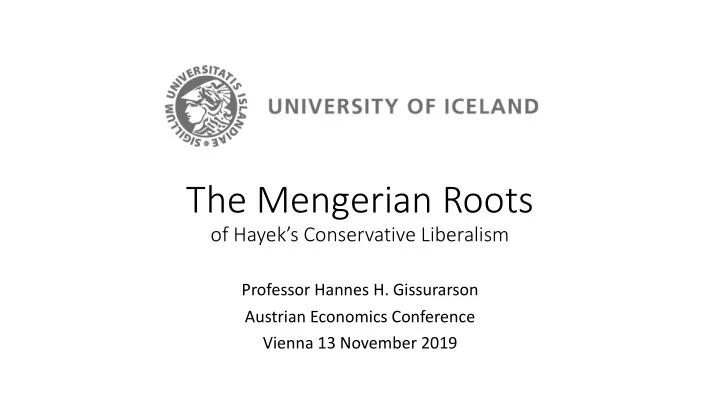

The Mengerian Roots of Hayek’s Conservative Liberalism Professor Hannes H. Gissurarson Austrian Economics Conference Vienna 13 November 2019
Friedrich August von Hayek • the most influential Austrian economist • the only one to receive a Nobel prize • inspired both Ronald Reagan and Margaret Thatcher • If 20 th century divided into quarters, then Lenin, Hitler, Keynes and Hayek could be meaningful labels of the epochs
Hayek Mengerian rather than Misesian • Menger, Mises and Hayek share most premises, all Austrians, subjectivists, liberals • But Hayek perhaps closer to Menger than to Mises • Fact obscured by his understandable reluctance to criticise Mises • Understandable because Mises was isolated, but an intellectual hero • Mises a rationalist, Menger and Hayek evolutionists, keenly aware of individual ignorance
Menger’s crucial question • “How can it be that institutions which serve the common welfare and are extremely significant for its development come into being without a common will directed toward establishing them?” • Examples: money, the law, markets, and the state • Rejects utilitarian liberalism as “the not infrequently impetuous effort to get away with what exists, with what is not sufficiently understood” • Such liberalism “contrary to the intention of its representatives, inexorably leads to socialism”
Socialism as Intellectual Error • Considering situations on their own merits, and not in the light of general principles, leads to interventionism and finally, to socialism • Failure to distinguish between purposeful institutions (e.g. a private company) and purposeless and spontaneous orders (e.g. language or the market) leads to a demand for a rational reconstruction of society • The market is a process in time subject to individual ignorance • Menger and Hayek therefore sceptical about individual reason • Menger however also criticised the German historical school as unable rationally to evaluate traditions
The Liberal Research Programme • To make the invisible hand visible • To explain unintended results of the actions of many men • In contrast to conspiracy theories (Popper) or hidden-hand explanations (Nozick) • Example. Income distribution is a modern, complex society the outcome of choices, and not a choice itself • Redistributionists guilty of a category error
Hayek’s Conservative Liberalism • Not conservatism (as noun). Hayek’s critique similar to that of Menger: unable to distinguish between good and bad traditions, or to present an intellectual alternative to present practices • But conservative (as adjective) in its respect for traditions and awareness of the limitations of individual human reason • The question is how the marvelous civilisation of the West was and is possible despite individual ignorance • The main answer is the transmission and creation of knowledge, made possible by prices and traditions
Hayek’s Admonition
Recommend
More recommend